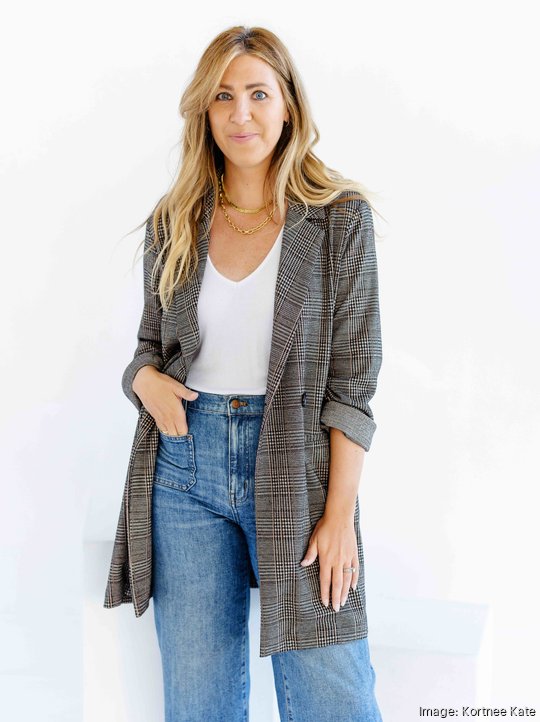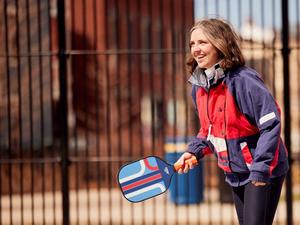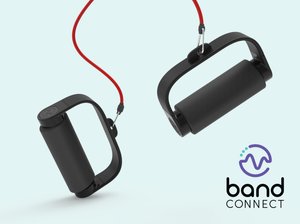
Cladwell was once one of Cincinnati’s most promising startups, but back in 2019, it went bust.
When Erin Flynn took over that year, after joining as a co-founder a few years prior, the personal styling company had essentially cut all staff, and its app was so bogged down and buggy, it needed to be rebuilt from scratch. It seemed to lack product-market fit, she said. But still there were glints of potential.
Today, Flynn's emerging from a heads-down rebuild, slowed somewhat by the Covid pandemic, but now ready to go. A new studio office in a Cincinnati suburb and a new product rollout – one that could be a first in fashiontech – means the outlook is bright.
“Ask Cladwell,” a feature that leans heavily into the world of ChatGPT, will allow users to get personalized style advice anytime. Flynn said it will be a huge driver for the company, which hit profitability for the first time earlier this year.
“In some ways it feels like Cladwell was meant for this era,” Flynn said. “Being able to use the data and knowledge we've gathered over the last 10 years – to combine that with AI – it’s magical.”
Inside the 'Clueless' closet
Cladwell, founded in 2013, started as a platform that helped men build a wardrobe and sold them clothes. Later, the company pivoted as a personal styling app centered on a capsule wardrobe philosophy. The idea is less is more and that a smaller wardrobe is the key to a bigger life.
Flynn said Cladwell today works a lot like the “Clueless” closet. In the 1995 movie by that name, a teen named Cher (Alicia Silverstone) browses and selects her outfits via computer. Cladwell gives its users daily outfit recommendations based on the items they already have, and they're personalized based on the weather or separated by activity like workout or work.
Flynn first joined the business in 2015 as a co-founder. It was her second startup stint, after launching a now-defunct business called Canopy, one of the earliest platforms that connected influencers with brands, an idea based on her earlier career as a fashion blogger. Just prior to Cladwell, she had worked as a marketer for E.W. Scripps.
At the time, Cladwell had just launched the women's side of the business, with tons of ideas for future growth.
It also was well versed on the venture capital roller coaster.
Cladwell had raised more than $3 million in capital, she said, but it wasn’t profitable and was still searching for product-market fit, while casting a bunch of different nets for revenue.
The company had gotten diluted to the point it made securing new funding difficult. The app ultimately became so bogged down with new features it was basically broken.
“We were on this billion-dollar-or-bust, shoot for the stars’ trajectory. We had given away so much of the company. And ultimately, it kind of went bust,” Flynn said.
Still, she saw something worth saving. In 2019, Flynn and her husband, Colin, acquired Cladwell and bought out nearly all its investors.
That meant starting from scratch, she said. She wanted to get back to the core of what Cladwell was meant to be.
Then the pandemic hit, another potential “go-bust” moment. Retailers were shuttering around the country, some permanently as folks around the world locked down. Cladwell “by all means” should have gone out of business, too, she said.
But once again it survived.
“We're an app that gets you dressed in the morning – and no one was getting dressed,” Flynn said. “But the idea of less is better actually worked in a pandemic. Everyone had the time to do closet clean outs. It made people rethink the way they were shopping.”
The power of ChatGPT
Cladwell 2.0 launched in spring 2021. The company has continued to shift in its business model. Instead of offering a free trial to users, the app is available on a freemium basis. Users can access limited features at no cost; more advanced offerings can be unlocked with a monthly ($7.99) or yearly ($59.99) subscription fee.
There are plans to rollout several new features, some “that have been requested for a really long time,” Flynn said. Cladwell even recently launched an Android version (its initial app was only available on Apple's iOS).
That has helped boost its numbers. Flynn declined to disclose the exact number of subscribers but that is in the thousands, and Cladwell earlier this year hit its one-millionth download.
To fuel growth, the company will expand to five or six new overseas markets this year. Roughly 30% of its audience is considered internationally based but in largely English-speaking countries.
“We're going to be translating the app so it's in their native languages,” she said.
The biggest buzz is around its newest rollout. “Ask Cladwell” allows for styling on demand, she said. It taps into the power of AI and ChatGPT, a chatbot that’s now all the rage.
Flynn said the feature can dress users for any occasion. It can name your personal style (are you Parisian or a naturalist?), dress you like a celebrity or influencer, or help you pack for a trip. It can help you fill the gaps in your closet – all visually without ever talking to a human but tailored to you.
She called it a new era of personal style. “Ask Cladwell” has soft launched on iOS with an official launch scheduled July 19 on both Apple and Android.
“It has huge potential,” Flynn said. “When it gives you a response, it’s giving you a visual, but it’s also taking into consider all the style information we have, versus giving you some bland option. It’s very powerful, and it will continue to evolve.”
Currently the Cladwell team sits around five employees. The company settled into new studio office space in the city of Wyoming’s business district in September 2022.
As for the company’s previous venture capital track? Don’t expect any future fundraises.
Cladwell hit profitability for the first time in February – and the company has sustained it.
Flynn said the path there has been very intentional.
“Our goal is profitability and to grow as fast and as much as we can, but in a way where we don't have to constantly be seeking out venture capital,” Flynn said.
“We’ve finally lifted our heads from building our product. And it feels amazing,” she added. “We're not trying to be a billion-dollar company. However, it could be worth millions of dollars, and we’re looking forward to seeing what happens next.”








